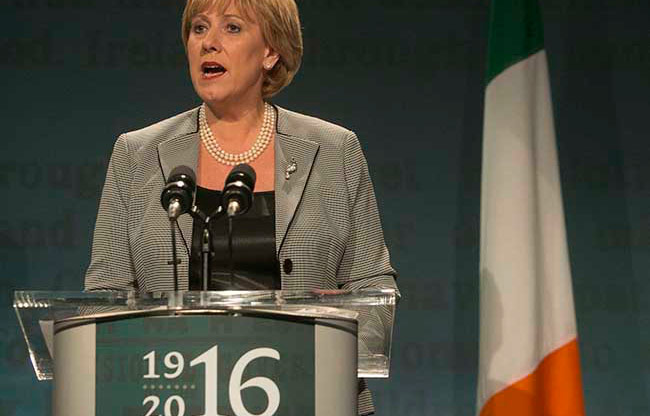Heather Humphreys, Minister for Arts, Heritage and Gaeltacht, this morning launched “Trinity and the Rising”, College’s programme of events to commemorate the 1916 Easter Rising.
Speaking in front of an original copy of the Irish Proclamation of Independence, the Minister said: “Academic discussion and debate will form a very important element of the Ireland 2016 Centenary Programme” and that “third-level institutions will be focal points as we look back at what life was like in 1916, examine what motivated the 1916 leaders and consider what has been achieved over the last 100 years.”
The programme, which the college will run until May 2016, includes a public reading of the 1916 Proclamation on the steps of the Dining Hall on March 15th next year, and a series of lectures on the theme of “Literature and Revolution” organised by the School of English.
The University Historical Society (the Hist) will also host a debate in February, featuring famous past members on the motion “This House Believes The Rising Should be Celebrated”.
The Minister went on to say that Trinity “will act as a hub of activity and analysis as we mark the centenary of the Easter Rising”, before praising Trinity’s “imaginative” and “thought-provoking” programme of events and lectures relating to the Rising. Humphreys praised the programme, saying there is “something for everyone to stimulate discussion” of the events.
Minister Humphreys also highlighted the importance of remembering, questioning and interpreting what happened during the Rising in order to reflect on our achievements and look to future of our country, acknowledging that Trinity’s students and staff will “ask the tough questions.”
The Vice Provost, Prof Linda Hogan, also spoke at the programme launch, saying that Trinity’s programme of events “draws colleagues and students around the university” together to remember the Rising. Hogan also highlighted Trinity’s engagement with the “big national conversation about the 1916 Rising”, stating that the programme “will not only provide dispassionate historical analysis of the events, motives and consequences associated with the Rising but it will also, through the medium of film, theatre, exhibition and online courses, provide expression to alternative viewpoints that will serve to illuminate pre-conceived ideas about the Rising.”
Eunan O’Halpin, Professor of Contemporary Irish History, spoke of the wider context in which the Rising occurred, paying particular attention to the First World War, as well as detailing many of the strong tries Trinity has with participants of the Rising on both sides of the fighting.
Professor O’Halpin commented that “Trinity was at the epicentre of the Rising that shook Ireland and the world in the round. Located in the heart of Dublin city centre, the campus became at once a bastion, a rallying point for Crown forces, and a place of succour for the wounded and the dying”.
The “Trinity and the Rising” programme also contains series of articles by Trinity staff and academics, including pieces on Trinity’s role in the debates surrounding the Rising and how the Rising affected students attending Trinity at the time.







